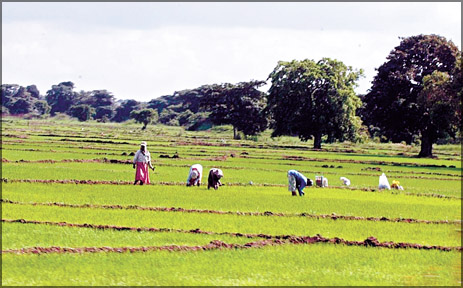The case for a global Food Bank
Thalif Deen
Bangladesh, one of the world's 49 least developed countries (LDCs)
described as the poorest of the poor, is calling for the creation of a
global food bank.
"We have suggested that a Food Bank could allow countries facing a
short-term shortfall in production to borrow food grains on preferential
terms," says Bangladeshi Prime Minister Fakhruddin Ahmed, who was in New
York last week to address the General Assembly.
 Once
they overcome the shortfall, these countries could return the quantum to
the Food Bank, he added. Once
they overcome the shortfall, these countries could return the quantum to
the Food Bank, he added.
At a summit meeting of the South Asian Association for Regional
Cooperation (SAARC) last August, the leaders of Afghanistan, Bangladesh,
Bhutan, India, the Maldives, Nepal, Pakistan and Sri Lanka reiterated
their own proposal for a regional food bank.
The proposal for a food bank comes at a time when most food-deficit
developing nations are worried that the spreading economic crisis will
impact on them sooner or later making the situation worse.
In an interview with IPS, Hamid Rashid, director-general of
Multilateral Economic Affairs in Dhaka, spelled out details of the
proposal which Bangladesh is pushing at the highest levels at the United
Nations.
"We envisage that the Global Food Bank will have two operational
'windows' to stabilise world food prices," Rashid said.
The first window, based on Special Drawing Rights (SDRs), will allow
countries to borrow food grains in times of crisis and shortfalls,
according to a pre-determined quota.
The quota for each country, Rashid said, will be determined on the
basis of a formula, taking into account the size of its vulnerable
population, variability in its food production, its dependence on food
imports and other related factors.
Borrowing countries will repay in the form of food grains. The food
stock will remain dispersed all over the world, perhaps closer to
high-risk locations, and will cross borders only when SDR would be
exercised, he added.
The second window of the Global Food Bank the market window will
create a trading platform for futures and options on food grains.
"Governments will be able to buy and sell futures and options, to and
from private parties, to smooth and stabilize the prices of food grains
over medium to long-run," Rashid said.
He added that whether his prime minister's proposal will materialize
or not will depend on a number of factors, including strong political
leadership, the willingness of large food exporters to participate in
such a mechanism and the lessons learnt from the current crisis.
Matthew Wyatt, assistant president in the external affairs department
of the Rome-based International Fund for Agricultural Development (IFAD),
said the global food price crisis has focused attention on the need to
ensure that countries that need to do so can source sufficient food to
feed their people.
Several ideas have been floated, involving physical or virtual grain
reserves, creation of regional or global funds for agricultural
development and food, establishment of private investment funds for
agricultural and enterprise development or a combination of all of
these, he said.
"IFAD welcomes the suggestion of the Bangladeshi prime minister as an
important contribution to this debate," Wyatt told IPS.
However, there is also a need to consider other instruments to
address access to food by poor rural people, including safety nets, cash
transfers, investments in increased smallholder agricultural
productivity and creation of sustainable non-agricultural economic
activities to increase the poor's capacity to demand food via the
market, he added. During the two-week high-level segment of the General
Assembly, which concluded last Friday, speaker after speaker underlined
the need for both short- and long-term solutions to the food crisis that
refuses to subside.
Indonesia, which claimed it had no food riots because of a rice
surplus, called for a "new green revolution".
Malawi pleaded for subsidies for agriculture and food production in
sub-Saharan Africa.
And Sierra Leone said that "massive investment in agriculture is the
key to a long-term solution to the continent's food crisis." The
country's president, Dr. Ernest Bai Koroma, told delegates last week he
welcomes the work of the Alliance for a Green Revolution in Africa
(AGRA), chaired by former U.N. Secretary-General Kofi Annan.
"The Alliance recognizes that massive investments in agriculture are
the key to a long-term solution to the continent's food crisis," Koroma
said.
Asked about a new green revolution, Wyatt of IFAD told IPS: "Despite
many successes and innovations in technology, institutions and practices
in recent decades, the Green Revolution breakthrough that jump started
Asia's agricultural growth in the 1960s and 1970s has not been mirrored
in the African continent."
A uniquely African and "doubly green" agricultural revolution is
needed to respond to challenges that are profoundly different from those
confronted by Asia 40 years ago and to Africa's diversity of
agro-ecological contexts and livelihoods, he said.
First of all, the nature of agriculture in Africa is different; it is
more diversified and resources and climatic conditions are more varied.
African agriculture, he pointed out, is dominated by small-scale
farmers and their skills, energy, innovations and experience must be
harnessed.
In many areas, progress is undermined by poor infrastructure, policy
discrimination against agriculture, low investment, armed conflicts and
chronic health problems such as TB, Malaria and HIV/AIDS.
Increasingly, higher food, energy and input prices are having
significant effects on household food security and purchasing power,
especially for net buyers of food.
Wyatt said increasing local, national and regional production and
trade are therefore critical priorities in the face of market
volatility.
One priority from IFAD's perspective is to insist on greater
investment in agricultural research, adaptation of technology and
strengthening demand-led extension services - especially for
smallholders and women.
An African Green Revolution will also need access to inputs,
including fertilizer, and strong private sector involvement. Rapidly
increasing food prices are a key challenge given that food accounts for
60-80 percent of a poor person's daily expenses.
Inter Press Service |

